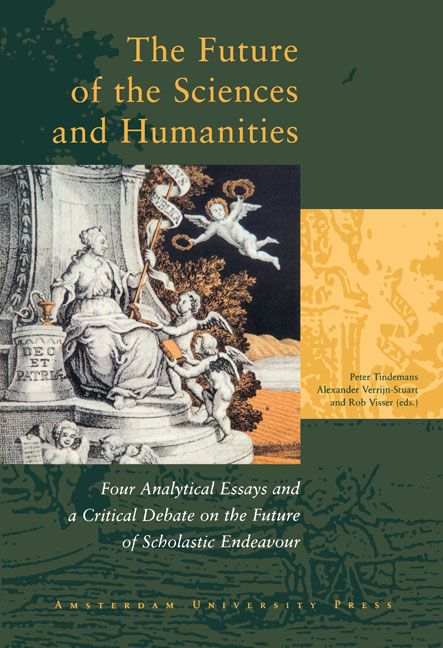 The Future of the Sciences and Humanities
The Future of the Sciences and Humanities Book contents
- Frontmatter
- Preface
- Contents
- 1 The Sciences and Arts Debate A review and some conclusions
- 2 Historical and Structural Approaches in the Natural and Human Sciences .
- The Role of Laws and Contingency in History
- 3 Science and Society in Flux
- Does A New Kind of Science Require a New Kind of Scholar or a New Kind of University?
- 4 Science for the 21st Century
- Redrawing Disciplinar Boundaries – but to What Degree?
- 5 Science and Democracy
- Science and Democracy: a Difficult Relationship: ‘An enlightened and elitist essay on an unresolvable problem’
- 6 Epilogue
- 7 Appendix
Redrawing Disciplinar Boundaries – but to What Degree?
Published online by Cambridge University Press: 03 February 2021
- Frontmatter
- Preface
- Contents
- 1 The Sciences and Arts Debate A review and some conclusions
- 2 Historical and Structural Approaches in the Natural and Human Sciences .
- The Role of Laws and Contingency in History
- 3 Science and Society in Flux
- Does A New Kind of Science Require a New Kind of Scholar or a New Kind of University?
- 4 Science for the 21st Century
- Redrawing Disciplinar Boundaries – but to What Degree?
- 5 Science and Democracy
- Science and Democracy: a Difficult Relationship: ‘An enlightened and elitist essay on an unresolvable problem’
- 6 Epilogue
- 7 Appendix
Summary
First of all, let me say that I agree with the main point of Prof. Rip's contribution, viz., the need to keep an open mind and affirm the plurality of forms of production of knowledge. Science as socially contingent but protected institutional space generates both awe and envy. Indeed, in the balance between search and authority, primacy to the serendipitous nature of the former has to be upheld in the sometimes stifling face of the latter. His demonstration of the historically situated and contingent character of the traditionally dominant image of science, the one that has tended to extrapolate and totalize a small physics-oriented segment in existing knowledge landscapes, is both perceptive and appreciated.
The dominant academic image, as he points out, was largely a projection of a very specific set of conditions and features in particular historical circumstances, reinforced in the 20th century by the advent of logical empiricist philosophers. Later it was found that not even physics lived up to its ideals (cf. N.R. Hanson, P. Feyerabend, S. Toulmin, T. Kuhn). With the emergence of a new (cognitive) sociology of science, combined with interest in policy, attention has been drawn to many other modes of science, among them medical and agricultural, engineering and not least chemical research, where trajectories have involved constant interfoliation with practical pursuits, in so-called contexts of application.
As a counterpoint today to the mainstream image of autonomous academic science traditionally celebrated in the epistemological lens of the analytic philosophy of science, sociologists and policy analysts have come up with the notion of Mode 2 and university-industry-governmental triplehelix complexes. Likewise, interdisciplinarity is played up in retrospective contrast to so-called Mode 1 monodisciplinary academic science, which in the polemics of the situation is highly schematized, thus paradoxically lending force to the earlier particularism that is to be rejected.
Arie Rip argues that also these new images of scientific knowledge production have a social epistemology that is rather limited in scope. They are ideologically coloured totalizations of another segment of the knowledge production landscape.
- Type
- Chapter
- Information
- The Future of the Sciences and HumanitiesFour Analytical Essays and a Critical Debate on the Future of Scholastic Endeavor, pp. 149 - 152Publisher: Amsterdam University PressPrint publication year: 2002


